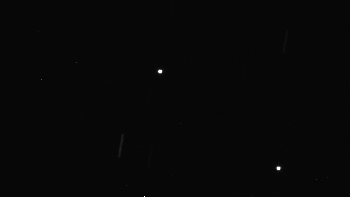
A Russian military satellite named Luch-2 was found closely approaching a geostationary satellite last month, a maneuver that follows in the footsteps of its predecessor that was found eavesdropping on other nations' satellites on multiple occasions since 2014.
Aldoria, a French startup that tracks satellites in orbit using a network of ground-based telescopes, alerted satellite operators in May 2024 that it had detected "a sudden close approach" by the Russian Luch-2 to a satellite positioned in geostationary orbit. The maneuver by Luch-2 occurred on April 12, 2024 about 22,232 miles (35,780 kilometers) from Earth's surface, the company said in a statement.
Aldoria did not disclose what satellite Luch-2 might have been spying on or precisely how close it approached the object. The minimum distance between the two objects was 6.2 miles (10 kilometers), while today (June 3) they are about 12 to 30 miles apart (20 to 50 kilometers), Saloua Moutaoufik, Aldoria's public relations manager, told Space.com in an email.
Related: Pentagon space chief condemns 'irresponsible' launch of Russian inspector satellite
The news of this close approach comes shortly after U.S. intelligence officials and the Pentagon accused Russia of attempting to militarize space by deploying a different military inspector satellite into the same orbit as a U.S. government satellite.
The Russian satellite, Cosmos 2576, "is likely a counterspace weapon presumably capable of attacking other satellites in low Earth orbit," U.S. Ambassador Robert Wood said on May 20 during a U.N. Security Council meeting. Russian Deputy Foreign Minister Sergey Ryabkov has denied the Pentagon's claims as fake news.
Meanwhile the Russian Luch-2, alternatively known as Olymp-2, launched secretly in March 2023 and in October that year moved within 37 miles (60 kilometers) of another geostationary spacecraft. By early December, it had left this position and loitered near a different satellite, according to autonomous monitoring by Slingshot Aerospace, a space data analytics firm focusing on spaceflight safety.
On both occasions, Slingshot did not identify the satellites, but representatives from the company told SpaceNews that the information could be useful for satellite operators worried about security in space.
Luch-2's recent maneuvers are not unprecedented when it comes to Russian spacecraft behavior. The satellite's predecessor, Luch-1, was a known interloper found close to other nations' satellites on multiple occasions, including in 2015 when it sparked international concern after it was parked directly between two Intelsat satellites for five months, at times maneuvering to about 6.2 miles (10 kilometers) of the American space vehicles.
While Intelsat officials said at the time that the Russian satellite did not interfere with their satellite services, this was the first publicly documented incident of a commercial operator approached by a foreign military satellite, SpaceNews reported. In 2018, France accused Russia of using Luch-1 to try and intercept communications from one of the country's satellites used for military purposes, calling it "not only unfriendly, but an act of espionage."
An analysis by an American non-profit thinktank found Luch-1 had hopped among at least 19 different spots around the geostationary belt as of 2020. Such maneuvers by Luch-1, which Russia launched in 2014, created "a heightened sense of vigilance within the space community," Aldoria said in last week's news release.
"Luch-2, like its predecessor, has a history of unusual maneuvering near other satellites in geostationary orbit, which has also generated suspicions regarding its mission," the company wrote.







